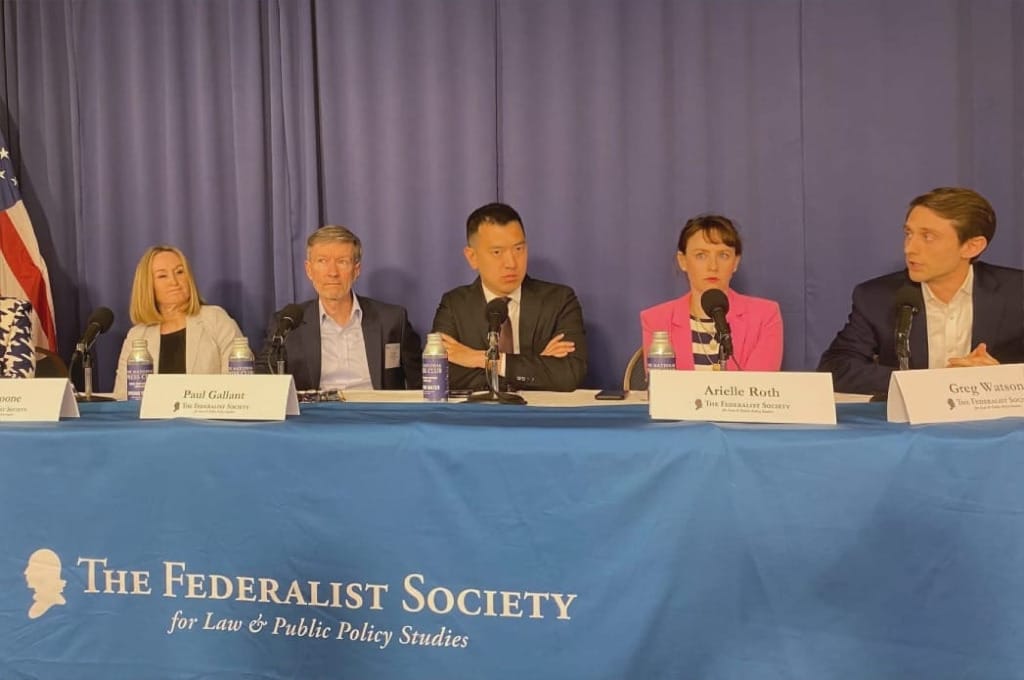FCC’s Digital Discrimination Order is Chilling Industry, GOP Advisor Claims
‘Industry is struggling with how to navigate the rules,’ GOP FCC advisor says.

‘Industry is struggling with how to navigate the rules,’ GOP FCC advisor says.

WASHINGTON, June 12, 2024 - A new regulatory framework to address digital discrimination has created a chilling effect felt across the broadband industry mainly because of its unclear enforcement, according to aides to Republican Federal Communications Commissioners.
“Out of fear of running afoul of the rules, companies will certainly avoid otherwise planned investments,” said Erin Boone, chief of staff and wireless advisor for Republican FCC Commissioner Nathan Simington.
On Tuesday, Boone was on a panel to discuss the FCC’s current regulatory approach.
Others on the panel were Republicans Greg Watson, chief of staff to FCC Commissioner Brendan Carr; Arielle Roth, Senate Commerce Committee Policy Director for Sen. Ted Cruz, R-Texas; and John Lin, senior counsel for the House Energy and Commerce Committee. Also on the panel was Washington Research Group Managing Director Paul Gallant.
The event was hosted by The Federalist Society, a conservative public policy organization in Washington.
The lightning rod of the discussion was the FCC's Digital Discrimination order, a framework adopted last November to enforce equitable access to connectivity. The order permits the FCC to investigate companies for alleged broadband access discrimination “not justified by genuine issues of technical or economic feasibility.”
Major Internet Service Provider organizations have sued to block the digital discrimination rules in the U.S. Court of Appeals for the Eighth Circuit in St. Louis.
Boone echoed Commissioner Simington’s dissenting opinion that the language in the digital discrimination order's compliance requirements was not specific enough for companies to confidently follow.
“Nothing can really prevent the FCC from reasonably arguing that a company violated the rules. In a competitive environment for investment dollars, this rule can’t do anything but chill investment,” Boone said.
Boone said the broadband industry is going to need time to analyze the rules before sharing feedback with the agency - an indication that many remain unclear about potential enforcement.
“Industry is struggling with how to navigate the rules and so they’re not even sure which questions to ask us,” Boone said.
For many months, Carr and Simington have resisted moves by Democratic FCC Chairwoman Jessica Rosenworcel to expand the agency’s authority.
Watson said that in the end, only Congress can rein in the FCC’s growing spending programs and burdensome regulations.
“... Without Congress getting involved and really requiring the FCC to do something, it’s difficult to see… our current leadership hom[ing] in on some of the problems,” Watson said.
Roth also criticized members of Congress for supporting a renewal of the Affordable Connectivity Program, while simultaneously supporting equity proposals that add financial burdens on the broadband industry.
“It just seems completely backward to be on one hand subsidizing the price of broadband and then on the other hand taking actions that significantly increase the cost of providing broadband,” Roth said.

The aviation industry backed the FAA’s proposed rules.

Christine Harada also joins as newest commissioner, while current CPUC President Alice Reynolds steps down.

The agency acted based on concerns the China-based labs had ties to the Chinese government.

City says affordability remains primary barrier to internet adoption
Member discussion